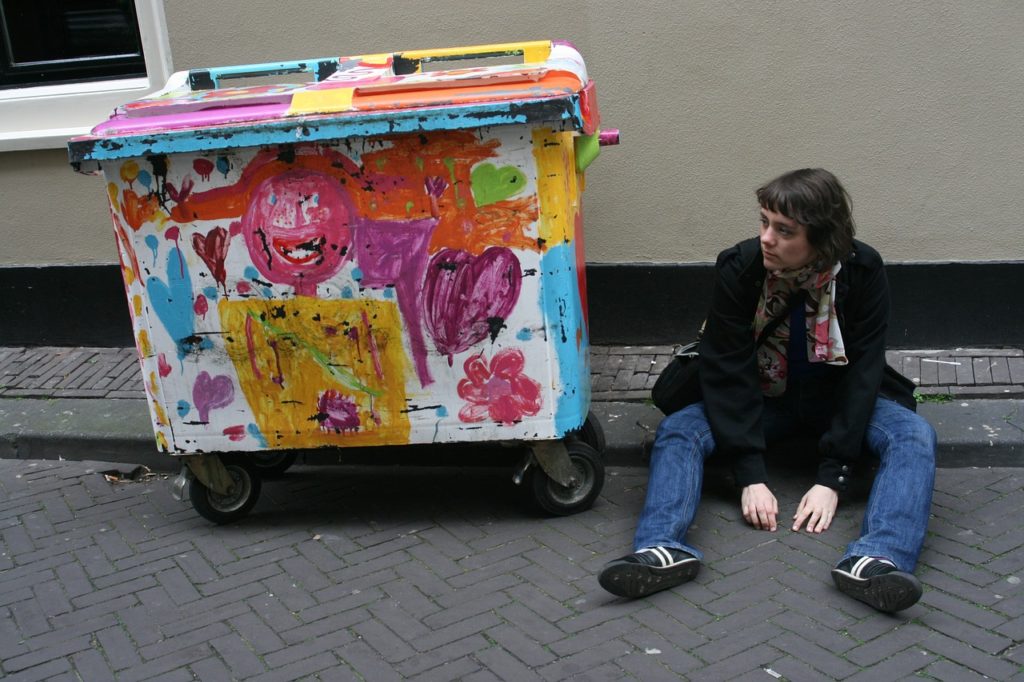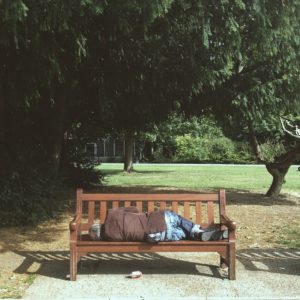
According to SAMHSA, substance abuse is more common among the homeless than the population in general [2]. Substance abuse can be a major contributor to homelessness due to difficulty or losing employment, struggling with paying bills, or having conflict with family.
According to a study from Bellevue Hospital in New York, which looked at 20 chronically homeless alcohol dependent patients, found that all 20 began drinking in childhood and had become dependant in childhood.
Three fourths came from addicted families and 19 of the 20 participants had left home before the age of 18 [2]. These statistics are staggering in terms of the duration of substance abuse, as well as the increase in homelessness.
The Federal definition of homelessness is “anyone who does not have a regular or fixed nighttime residence that is adequate for their needs and individuals who live temporarily in an institution, shelter or anywhere that is not created as a place for humans to sleep” [7].
Many homeless use substances to forget about their problems, or to keep warm. Often the use to escape their reality. The homeless population is in desperate need of services to help them get to treatment, and recover following treatment.
According to the National health Care for the Homeless Council, approximately 25% of homeless who have an addiction receive treatment. Those centers that do provide treatment for the addicted homeless tend to provide specific services [2].
Restoring Basic Needs
Recovering from homelessness after drug addiction takes various services to help restore basic needs. One type of service offered to those in treatment is housing options. Treatment can provide a stable living environment to those living on the streets. Treatment centers that focus on the addicted homeless incorporate housing into their program.
 Having professional and trained staff is another key factor in recovery as well for this population. Client centered services that are tailored to meet the needs of each individual.
Having professional and trained staff is another key factor in recovery as well for this population. Client centered services that are tailored to meet the needs of each individual.
Integrated services is also important as many homeless also have co-occurring disorders and need multiple models of services.
Comprehensive services are also essential to help the recovering addict obtain housing, a job, community support groups, and aftercare services to help prevent the individual to returning to a homeless environment.
Services for Addiction Recovery
When recovering after an addiction, traditional outpatient treatment services are not enough to meet the needs of the homeless population. It is essential that this population receive housing, in a structured atmosphere, that can reduce the likelihood of the individual relapsing.
In a study that compared outcomes for homeless individuals in either an intensive program versus a day treatment program, found that clients who were in the intensive program had higher improvement outcomes from depression, employment, housing and substance abuse recovery [2].
There are various programs that are being tested to assist this population [8, 9], One is Housing First Models where the focus first on finding safe, affordable housing for addicts. This model believes that once someone’s basic needs of shelter, food, water, and safety are met they are encouraged to receive and maintain treatment.
A second model is self help models. These are typically 12-step programs and are offered at shelters or community agencies.Often these do not provide housing options, but do offer a community of support in maintaining sobriety.
Third, various cities are starting to offer drug free, low income group housing that are offered to individuals after graduating from treatment. This approach works to help fight homeless after recovering from an addiction and help support them in obtaining life skills and employment.
Impact of Homelessness
Often times substance abuse is a main cause of homelessness. Addiction can disrupt relationships, family, friends, and employment. It can be difficult for an addict to stay employed and manage bills. In 2008 a survey was done in 25 cities, surveying what the top three causes of homelessness are.
Substance abuse was the number one cause, with drugs a close second [1]. Samaritan Inns is another option for recovering homeless [9]. It is a 28 day social detoxification program, where residents are given four to six months temporary residents and are required to look for a job and stay sober. If successful, the participant at the end of the 4-6 month period has 1-3 years to stay in one of the apartments.
 The Salvation Army is another option for those Recovering From Homelessness After Drug Addiction. Through this organization, individuals are given treatment for chemical dependency, life skills classes, increasing self awareness and personal responsibility. Individuals work to develop coping skills and are able to participate in comprehensive counseling. The Salvation Army offers participants work at the SA Thrift Stores to be able to have employment and independence.
The Salvation Army is another option for those Recovering From Homelessness After Drug Addiction. Through this organization, individuals are given treatment for chemical dependency, life skills classes, increasing self awareness and personal responsibility. Individuals work to develop coping skills and are able to participate in comprehensive counseling. The Salvation Army offers participants work at the SA Thrift Stores to be able to have employment and independence.
Housing and Human Services (HUD) offers programs to help fight homelessness [10]. One is their Supportive Housing Program (SHP) works to develop supportive services for individuals who are wanting to seek independent living.
This program helps homeless find a stable place to live, increase work/life skills, and obtain employment. Shelter Plus Care Programs are those where nonprofits can apply for rental assistance for permanent housing for homeless clients. This is accessed through a State or Local level.
In conclusion, there are some options for recovering homeless individuals to seek housing, aftercare, and support following treatment for addiction. Assistance seems to come in all forms from organizational, to community support. Knowing where to go and accessing support while in treatment can be a great tool in finding stable housing after discharge.
 About the Author: Libby Lyons is a Licensed Clinical Social Worker and Certified Eating Disorder Specialist (CEDS). Libby has been practicing in the field of eating disorders, addictions, depression, anxiety and other comorbid issues in various agencies. Libby has previously worked as a contractor for the United States Air Force Domestic Violence Program, Saint Louis University Student Health and Counseling, Saint Louis Behavioral Medicine Institute Eating Disorders Program, and has been in Private Practice.
About the Author: Libby Lyons is a Licensed Clinical Social Worker and Certified Eating Disorder Specialist (CEDS). Libby has been practicing in the field of eating disorders, addictions, depression, anxiety and other comorbid issues in various agencies. Libby has previously worked as a contractor for the United States Air Force Domestic Violence Program, Saint Louis University Student Health and Counseling, Saint Louis Behavioral Medicine Institute Eating Disorders Program, and has been in Private Practice.
Libby currently works as a counselor at Fontbonne University and is a Adjunct Professor at Saint Louis University, and is a contributing author for Addiction Hope and Eating Disorder Hope. Libby lives in the St. Louis area with her husband and two daughters. She enjoys spending time with her family, running, and watching movies.
References:
[1] http://www.nationalhomeless.org/factsheets/addiction.pdf
[2] http://www.michaelshouse.com/drug-abuse/study-homelessness-addiction/
[3] http://www.rehabs.com/homeless-addicts-need-treatment-before-housing/
[4] https://archives.drugabuse.gov/NIDA_Notes/NNVol12N4/Access.html
[5] https://thecisforcrank.com/2016/03/21/homelessness-and-addiction-part-1-why-dont-they-just-get-help/
[6] https://www.ncbi.nlm.nih.gov/pmc/articles/PMC3490566/
[7] http://alcoholrehab.com/drug-addiction/homelessness-and-substance-abuse/
[8] http://www.12keysrehab.com/blog/drug-addiction-and-homelessness
[9] http://usatoday30.usatoday.com/news/nation/2011-03-31-wethouses31_ST_N.htm
[10] http://familypromise.org/overview-of-hud-homeless-and-housing-programs/
The opinions and views of our guest contributors are shared to provide a broad perspective of addictions. These are not necessarily the views of Addiction Hope, but an effort to offer discussion of various issues by different concerned individuals.
We at Addiction Hope understand that addictions result from a combination of environmental and genetic factors. If you or a loved one are suffering from an addiction, please know that there is hope for you, and seek immediate professional help.
Reviewed By: Jacquelyn Ekern, MS, LPC on March 25, 2017.
Published on AddictionHope.com
